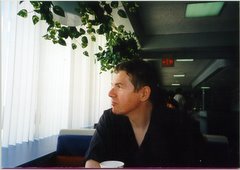"Bitter Bierce," as he was known for his uncompromising honesty
As part of the content-rich Resource Guide at the end of my supernatural horror short story, "It's Your Funeral," I offer five short essays on the masters of modern supernatural horror fiction—Arthur Machen, H.P. Lovecraft, Robert Aickman, Clark Ashton Smith, and Ambrose Bierce.
Here are my insights on the riveting Ambrose Bierce, one of the most neglected great American writers of the period between the Civil War and World War One. In 2014, the first season of HBO’s acclaimed True Detective miniseries reawakened interest in him because of its repeated references to his signature supernatural tales (vide the repeated references in the show to “the Lake of Hali,” "Hastur," and “Caricosa,” all Bierce’s creations.)
Bierce close to when he vanished in Mexico in 1914
Bierce is certainly an influence on my short story "It's Your Funeral," which is about a certain famed Hollywood superstar who is alleged to secretly practice Santería—to further her career.
You can order it as an ebook here on Amazon for only $.99.
Is Ambrose Bierce a greater writer than Mark Twain? Sometimes I’m inclined to think so. No one can deny Twain’s astonishing genius in The Adventures of Huckleberry Finn, one of the great American novels. But Bierce was a lot of tougher and braver than Twain, both as a writer and as a person.
Twain paid a high price for that white suit and his genial public image: his wife consistently censored him to please Victorian propriety, hiding his true artistic self
Lieutenant Ambrose Bierce in the Civil War; he warn't no draft dodger
Where Twain dodged the Civil War by escaping West to Nevada, Bierce fought in the monstrosity known as Shiloh; and where Twain drowned in nauseating sentimentally and audience-pandering humor, Bierce never disguised his unrelenting bitterness and hatred of “the whole damned human race”; he’s much more honest and direct, as seen in his enduring monument to cynicism, The Devil's Dictionary.
In his landmark collection of supernatural fiction, Can Such Things Be?, he asserts himself as the undisputed bridge in American weird fiction between Poe, Robert W. Chambers, and H.P. Lovecraft. His renowned horror story The Damned Thing, with its invisible monster whose substance surpasses the infrared and ultraviolent spectrums, is a classic, with strong science fiction overtones.
An artist's interpretation of the hidden appearance of The Damned Thing
The Ambrose Bierce Site captures the full range of his angry genius.
When read today, Bierce seems surprisingly modern, like Hemingway (whom he certainly influenced, through his war stories). He is undoubtedly America’s greatest writer of its greatest conflict, the Civil War; Chickamauga is unforgettable (see the brilliant Robert Enrico French film version here).
The deaf child innocently enjoying the gruesome spectacle of the battle of Chickamauga
The carnage of the real battlefield
Many are familiar with An Occurrence at Owl Creek’s Ridge, whose conceit has been copied innumerable times, from Robert Enrico’s first-rate film version televised on The Twilight Zone in 1964.
An Occurrence at Owl Creek's Ridge: the mind escapes what it cannot stand. Its lasting influence can be seen everywhere in contemporary fiction, including the 1990 Tim Robbins' film Jacob's Ladder
But what strikes you in reading Can Such Things Be? is the hauntingly recurring theme in his short stories of soldiers from the Civil War awakening in sunny fields and not knowing where they are: because they’re dead, and their spirits are regaining consciousness temporarily on the battlefields where they lost their lives many years before.
Here Bierce points out the shattering truth that America died in the Civil War (it killed itself), but it doesn’t know it; and not all the rhetorical hot air about “progress” and vapid Gilded Age commercialism can sustain it. It’s a profound insight.
A warning: the famous “Missing Persons” stories (such as “The Difficulty of Crossing a Field,” passed off as an authentic paranormal experience by the dreadful liar Frank Edwards) can only be found in the 1919 Boni & Liveright edition. But when you read Ambrose Bierce, you’re in the room with real literature—the same experience you have with Arthur Machen and Robert Aickman.
Bierce vanished in the wilderness of northern Mexico in 1914 chasing Pancho Villa; many thought the old man had a death wish and wanted to walk into a furnace. Ironically he vanished completely, like the characters in his famed mysterious "Missing Persons" stories


















